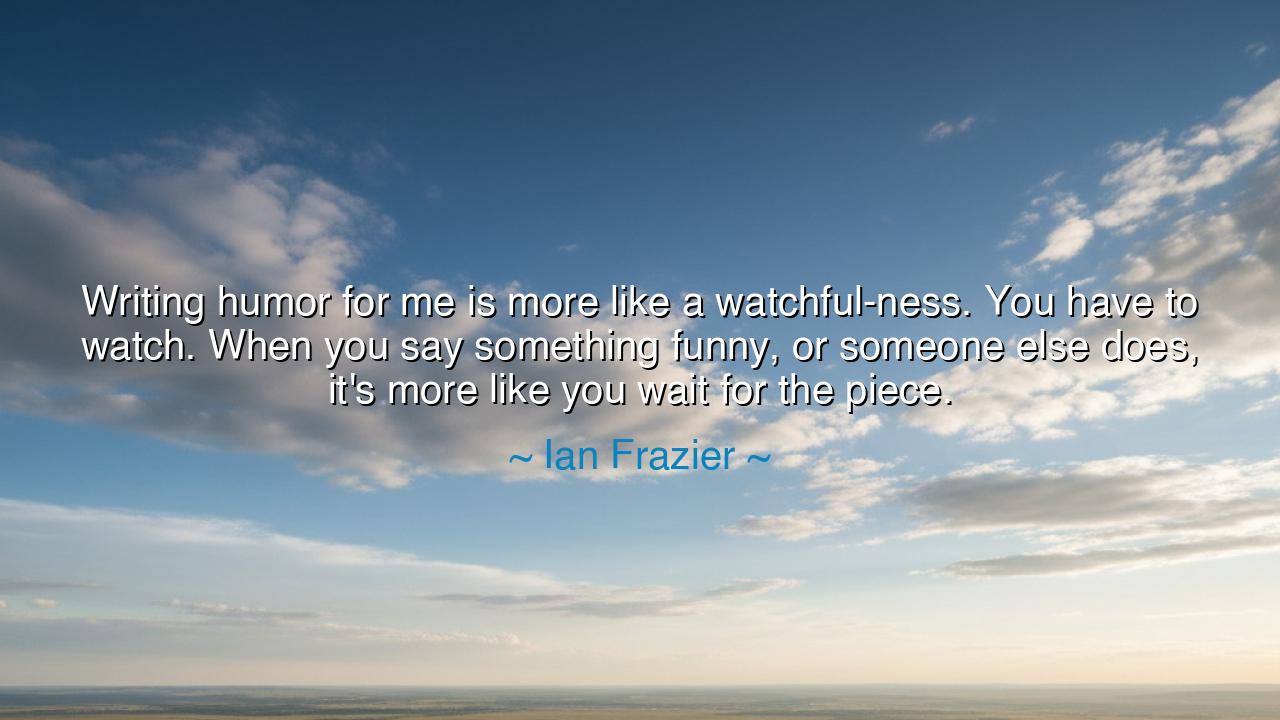
Writing humor for me is more like a watchful-ness. You have to
Writing humor for me is more like a watchful-ness. You have to watch. When you say something funny, or someone else does, it's more like you wait for the piece.






Hear the words of Ian Frazier, a master of wit whose laughter is born not from chaos, but from calm: “Writing humor for me is more like a watchful-ness. You have to watch. When you say something funny, or someone else does, it’s more like you wait for the piece.” Though they sound simple, these words carry the weight of ancient wisdom. They speak of the patience of the observer, the humility of the artist, and the mystery of creation itself. For in every age, those who have sought to understand truth—whether poets, philosophers, or jesters—have known that the world reveals its deepest secrets not to the loud or the hurried, but to the one who waits and watches.
Frazier’s reflection unveils the true essence of humor, not as a weapon or a trick, but as a revelation. To be watchful is to live in awareness—to see what others miss, to listen where others speak, to notice the divine absurdity woven through the fabric of human life. The writer of humor must become a silent student of existence, catching those fleeting moments when truth hides itself in laughter. Humor, in this sense, is not invented; it is discovered. It is the recognition of life’s beautiful contradictions—the solemn mingling with the silly, the noble brushing shoulders with the ridiculous. And to write it well, one must not force the world to be funny, but wait until the world reveals its natural comedy.
This way of seeing is not new. The ancients practiced it in temples and marketplaces alike. Diogenes the Cynic, that wandering philosopher of Greece, carried a lantern in daylight, claiming to search for an honest man. His actions seemed foolish, yet through his absurdity, he exposed the pretensions of society. He was not mocking for sport—he was watching, waiting for the truth to show itself through the cracks of human vanity. Like Frazier, he understood that humor arises not from invention but from recognition. The fool and the sage both dwell in the same house—they simply choose different rooms.
The watchful humorist is also a kind of mirror-maker. He does not sculpt laughter out of stone, but polishes the glass until it reflects the world as it truly is—distorted, profound, and endlessly amusing. Consider Mark Twain, whose stories of the Mississippi carried the wisdom of the ages beneath their laughter. Twain watched people closely—he saw the hypocrisies of politicians, the pomp of preachers, the frailties of dreamers—and he turned observation into illumination. His humor was the light that revealed the truth, and yet, it was gentle, not cruel. This is what Frazier means when he says one must “wait for the piece.” The humorist does not chase the joke; he allows the truth to come to him in its own time.
To practice this watchful-ness is not only to write better, but to live better. The one who watches learns patience. He learns that wisdom does not rush and that laughter, like the dawn, must arrive naturally. Those who hurry to be funny often grasp at shadows; their words amuse but do not endure. But the one who waits—who listens for the heartbeat of the world—finds laughter that lasts. For in every moment of human life, whether joyful or sorrowful, there lies some spark of irony, some whisper of humor waiting to be seen by the attentive eye.
Frazier’s wisdom also carries a quiet humility. The humorist, he reminds us, is not the creator of laughter, but its messenger. Just as the poet listens for the rhythm of the universe, and the philosopher listens for the silence between truths, so the humorist listens for the moment when life begins to laugh at itself. To wait for the piece is to trust that the world is already rich with stories, that meaning is always present, if only we would learn to see it. Humor, then, becomes not a distraction from reality, but a way of embracing it more deeply.
Let this be the lesson, then: cultivate watchfulness in all things. Be present in your days, attentive to the small absurdities and quiet miracles that pass before you. When others rush to fill the silence, be still and observe. When life seems heavy, look closer—for often the heart of comedy beats beneath the surface of tragedy. Patience, not cleverness, is the true source of insight. Humor will come to those who wait with open eyes and gentle hearts.
And so, O seeker of truth and laughter, take heed of Ian Frazier’s words. Do not chase the joke, nor force the wisdom. Watch. Wait. Trust that life itself will hand you its laughter in time. For when you learn to see with such stillness, every street, every face, every moment becomes a stage—and every breath becomes part of the eternal comedy of being alive.






AAdministratorAdministrator
Welcome, honored guests. Please leave a comment, we will respond soon